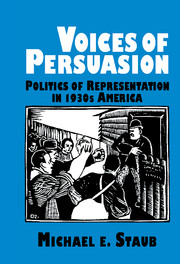Book contents
- Frontmatter
- Contents
- Acknowledgments
- Preface
- 1 Spoken Testimony, Unwritten History
- 2 John Dos Passos and James Agee: You Won't Hear It Nicely
- 3 John Neihardt, William Benson, and Ruth Underhill: Telling Native American History
- 4 Zora Neale Hurston: Talking Black, Talking Back
- 5 Tillie Olsen and the Communist Press: Giving the People Voice
- Notes
- Bibliography
- Index
- CAMBRIDGE STUDIES IN AMERICAN LITERATURE AND CULTURE
2 - John Dos Passos and James Agee: You Won't Hear It Nicely
Published online by Cambridge University Press: 22 March 2010
- Frontmatter
- Contents
- Acknowledgments
- Preface
- 1 Spoken Testimony, Unwritten History
- 2 John Dos Passos and James Agee: You Won't Hear It Nicely
- 3 John Neihardt, William Benson, and Ruth Underhill: Telling Native American History
- 4 Zora Neale Hurston: Talking Black, Talking Back
- 5 Tillie Olsen and the Communist Press: Giving the People Voice
- Notes
- Bibliography
- Index
- CAMBRIDGE STUDIES IN AMERICAN LITERATURE AND CULTURE
Summary
DOCUMENTARY” was a new word in the 1930s, coined by the film critic John Grierson in 1926. The strongest intentions of Depression-era documentary expression were simply to dramatize immediate political agendas, to heighten awareness and intensify discussion of social ills. Most documentary writers assumed that their writing might bring readers a direct experience of persecution, poverty, or oppression. Much of this outpouring thus promoted the position that documentary provided a transparent lens onto the real, rather than opaque representations. This claim was crucial to the documentary's immediate political effectiveness, and yet it masked deeper problems. But there were other documentarians, among them John Dos Passos and James Agee, who suspected or realized that this assumption was false.
Dos Passos's Facing the Chair (1927) and Agee and Walker Evans's Let Us Now Praise Famous Men (1941) roughly mark the historical parameters of this study. Examining these two documentary narratives that bracketed the thirties can elucidate the dilemmas of the genre while reconceptualizing the cultural-historical importance of those dilemmas. Facing the Chair, written on behalf of the Defense Committee for Nicola Sacco and Bartolomeo Vanzetti in an effort to stave off their executions, was a documentary that emerged out of a Progressive Era tradition in which journalists advocated improved social conditions by dramatizing how a political failure to act would eventually disrupt the security of their middle-class readership. A well-known example is provided by the activist writings of Jacob Riis, which succeeded in catalyzing a range of Progressive Era legislation.
- Type
- Chapter
- Information
- Voices of Persuasion , pp. 20 - 53Publisher: Cambridge University PressPrint publication year: 1994

